大学英语第四册 快速阅读翻译unit2
大学英语精读第三版第四册Book4 Unit2

大学英语精读第三版第四册Book4 Unit21) bull2) horse3) dog4) dog5) tiger6) tiger7) lioness8) goose9) fowl10) cock11) duck1) practical2) scarcity3) external4) raise5) rise6) waste7) deficiency8) minimum9) draw10) insufficient11) reduce12) freeze1) fundamental2) deposited3) in the form of4) in good condition/in condition5) currencies6) resources7) lowering8) conceived9) Rhythm10) reserve11) romantic12) productivity13) dependent14) internal1) mature2) reserve3) deposit/deposit enough money4) currency5) ample6) fundamental7) given birth to8) somewhat9) an excess10) expended11) safeguard12) conceive1) drew on/draws on2) depend on3) slowing down4) put on5) turn down1) The country is trying to be/become less dependent on foreign aid.2) It amused us to see the actor's beard fall off.3) The rhythm of life is made up of a cycle of birth, youth, maturity, and death.4) Conservation of our mineral resources is highly important because they can never be replenished.5) Parking spaces in this city are scarce on Saturdays.1) man-eating2) earth-shaking3) body-building4) labor-saving5) fact-finding6) record-breaking7) tone-setting8) paper-cutting1) biochemistry: the science that deals with the chemical processes of living animals and plants; biological chemistry2) biocide: any substance poisonous to life3) bioconversion: the conversion of biological waste, garbage, and plant material into energy, fertilizer, and other useful products4) biophysics: the branch of biology which applies the laws of physics to explain the phenomena of biology5) ecoactivity: any project or undertaking to combat pollution or improve the quality of the environment6) ecocatastrophe: a large-scale or world-wide disaster resulting from uncontrolled use of pollutants7) ecocide: the destruction of the earth's environment or ecology through the uncontrolled use of pollutants8) ecospecies: a group of organisms only somewhat fertile with organisms of related groups, usually considered equivalent to a species1) All children in that country are2) all her life/her whole life3) Whole Indian tribes in the region were killed off.4) the whole staff/all the staff5) all the time/the whole time6) this whole business/all this business1) in the case of Tom: he was ill.2) A case in point is Dujiangyan, which was built about 2000 years ago.3) in the case of my two college sons, they try to live on their parents as long as possible.4) A case in point is the successful launching of space shuttles.5) A case in point is the chimp, who can learn to paint like a small child.1) He does not lend his books to everybody.2) She is not always so cooperative.3) Not all his stories make interesting reading.4) This plant is not to be found everywhere.5) The exhibits are not all of them worth looking at.1) go round2) romantic3) fundamental4) dependent6) abundant7) deposited8) scarce9) slowing down10) pull through11) draw on12) in good condition13) give birth to1) with2) on3) future4) as5) to6) cycles7) rhythms8) from9) body11) studying12) over13) that14) effects15) direction16) take17) one翻译1) 比尔已是个成熟的小伙子,不再依赖父母替他做主。
大学英语阅读教程4,U2参考翻译
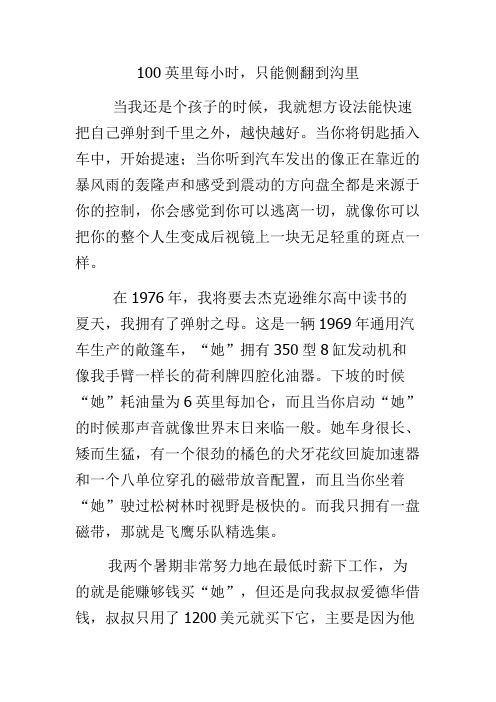
100英里每小时,只能侧翻到沟里当我还是个孩子的时候,我就想方设法能快速把自己弹射到千里之外,越快越好。
当你将钥匙插入车中,开始提速;当你听到汽车发出的像正在靠近的暴风雨的轰隆声和感受到震动的方向盘全都是来源于你的控制,你会感觉到你可以逃离一切,就像你可以把你的整个人生变成后视镜上一块无足轻重的斑点一样。
在1976年,我将要去杰克逊维尔高中读书的夏天,我拥有了弹射之母。
这是一辆1969年通用汽车生产的敞篷车,“她”拥有350型8缸发动机和像我手臂一样长的荷利牌四腔化油器。
下坡的时候“她”耗油量为6英里每加仑,而且当你启动“她”的时候那声音就像世界末日来临一般。
她车身很长、矮而生猛,有一个很劲的橘色的犬牙花纹回旋加速器和一个八单位穿孔的磁带放音配置,而且当你坐着“她”驶过松树林时视野是极快的。
而我只拥有一盘磁带,那就是飞鹰乐队精选集。
我两个暑期非常努力地在最低时薪下工作,为的就是能赚够钱买“她”,但还是向我叔叔爱德华借钱,叔叔只用了1200美元就买下它,主要是因为他支付了数百美元的账单。
“孩子,你开车的时候要小心点”叔叔说,“否则它随时会置你于死地。
”我向他保证,好的,我会很慢地开,像老人行动一样慢。
我告诉我自己,我喜欢那辆车,因为“她”是那么漂亮,速度是那么快;还因为我喜欢和金发飘飘的"她"在一排排松树间轰隆隆地飞驰而过,而这个女孩还不知道她比我更擅长在风中奔驰呢。
事实是,我喜欢“她”,因为“她”是我的均衡器。
“她”教会我成长,至少在我眼里,“她”让我更进一步地看到自己想要成为怎样的人。
在高中,我既不是那种十分受欢迎的人也不是那种努力迎合别人的人。
我和受欢迎的孩子一起被邀请去聚会,我和漂亮的女孩约会。
但是那常常与我想要成为的人有一段距离。
那辆车,让我在某种程度上接近我想要成为的人。
在哈迪斯快餐连锁店,人们围过来参观“她”。
我只让一个人驾驶过“她”,那就是学校里最漂亮的姑娘,帕特里斯·卡莉,但她也仅仅只是驾驶了一公里。
新标准大学英语综合教程4 Active Reading2 课文翻译
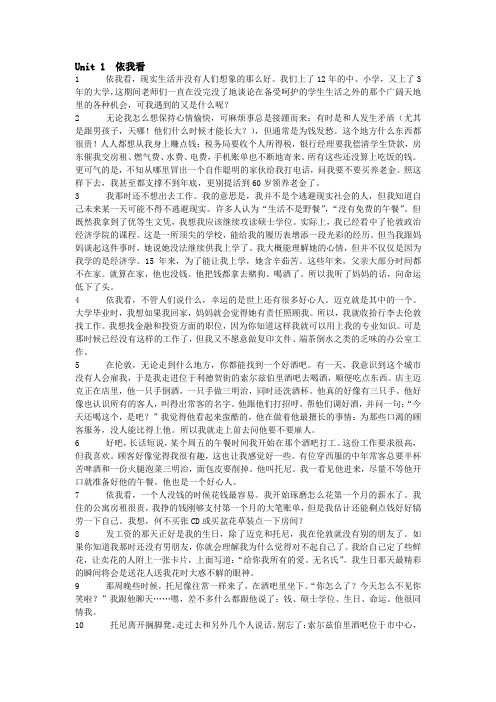
Unit 1 依我看1 依我看,现实生活并没有人们想象的那么好。
我们上了12年的中、小学,又上了3年的大学,这期间老师们一直在没完没了地谈论在备受呵护的学生生活之外的那个广阔天地里的各种机会,可我遇到的又是什么呢?2 无论我怎么想保持心情愉快,可麻烦事总是接踵而来:有时是和人发生矛盾(尤其是跟男孩子,天哪!他们什么时候才能长大?),但通常是为钱发愁。
这个地方什么东西都很贵!人人都想从我身上赚点钱:税务局要收个人所得税,银行经理要我偿清学生贷款,房东催我交房租、燃气费、水费、电费,手机账单也不断地寄来。
所有这些还没算上吃饭的钱。
更可气的是,不知从哪里冒出一个自作聪明的家伙给我打电话,问我要不要买养老金。
照这样下去,我甚至都支撑不到年底,更别提活到60岁领养老金了。
3 我那时还不想出去工作。
我的意思是,我并不是个逃避现实社会的人,但我知道自己未来某一天可能不得不逃避现实。
许多人认为“生活不是野餐”,“没有免费的午餐”。
但既然我拿到了优等生文凭,我想我应该继续攻读硕士学位。
实际上,我已经看中了伦敦政治经济学院的课程。
这是一所顶尖的学校,能给我的履历表增添一段光彩的经历。
但当我跟妈妈谈起这件事时,她说她没法继续供我上学了。
我大概能理解她的心情,但并不仅仅是因为我学的是经济学。
15年来,为了能让我上学,她含辛茹苦。
这些年来,父亲大部分时间都不在家。
就算在家,他也没钱。
他把钱都拿去赌狗、喝酒了。
所以我听了妈妈的话,向命运低下了头。
4 依我看,不管人们说什么,幸运的是世上还有很多好心人。
迈克就是其中的一个。
大学毕业时,我想如果我回家,妈妈就会觉得她有责任照顾我。
所以,我就收拾行李去伦敦找工作。
我想找金融和投资方面的职位,因为你知道这样我就可以用上我的专业知识。
可是那时候已经没有这样的工作了,但我又不愿意做复印文件、端茶倒水之类的乏味的办公室工作。
5 在伦敦,无论走到什么地方,你都能找到一个好酒吧。
有一天,我意识到这个城市没有人会雇我,于是我走进位于利德贺街的索尔兹伯里酒吧去喝酒,顺便吃点东西。
大学英语英语第四册阅读教程翻译(整理版)
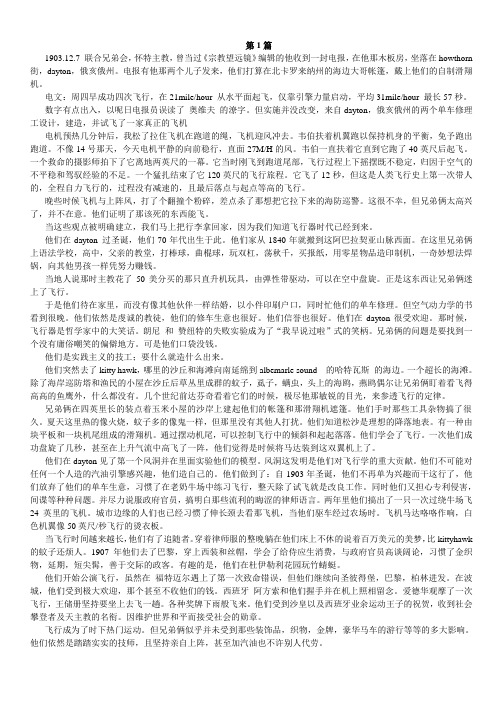
第1篇1903.12.7 联合兄弟会,怀特主教,曾当过《宗教望远镜》编辑的他收到一封电报,在他那木板房,坐落在howthorn 街,dayton,俄亥俄州。
电报有他那两个儿子发来,他们打算在北卡罗来纳州的海边大哥帐篷,戴上他们的自制滑翔机。
电文:周四早成功四次飞行,在21mile/hour 从水平面起飞,仅靠引擎力量启动,平均31mile/hour 最长57秒。
数字有点出入,以呢日电报员误读了奥维夫的潦字。
但实施并没改变,来自dayton,俄亥俄州的两个单车修理工设计,建造,并试飞了一家真正的飞机电机预热几分钟后,我松了拉住飞机在跑道的绳,飞机迎风冲去。
韦伯扶着机翼跑以保持机身的平衡,免予跑出跑道。
不像14号那天,今天电机平静的向前稳行,直面27M/H的风。
韦伯一直扶着它直到它跑了40英尺后起飞。
一个救命的摄影师拍下了它离地两英尺的一幕。
它当时刚飞到跑道尾部,飞行过程上下摇摆既不稳定,归因于空气的不平稳和驾驭经验的不足。
一个猛扎结束了它120英尺的飞行旅程。
它飞了12秒,但这是人类飞行史上第一次带人的,全程自力飞行的,过程没有减速的,且最后落点与起点等高的飞行。
晚些时候飞机与上阵风,打了个翻撞个粉碎,差点杀了那想把它拉下来的海防巡警。
这很不幸,但兄弟俩太高兴了,并不在意。
他们证明了那该死的东西能飞。
当这些观点被明确建立,我们马上把行李拿回家,因为我们知道飞行器时代已经到来。
他们在dayton 过圣诞,他们70年代出生于此。
他们家从1840年就搬到这阿巴拉契亚山脉西面。
在这里兄弟俩上语法学校,高中,父亲的教堂,打棒球,曲棍球,玩双杠,荡秋千,买报纸,用零星物品造印制机,一奇妙想法焊锅,向其他男孩一样凭努力赚钱。
当地人说那时主教花了50美分买的那只直升机玩具,由弹性带驱动,可以在空中盘旋。
正是这东西让兄弟俩迷上了飞行。
于是他们待在家里,而没有像其他伙伴一样结婚,以小件印刷户口,同时忙他们的单车修理。
泛读英语第四册unit2课文及翻译
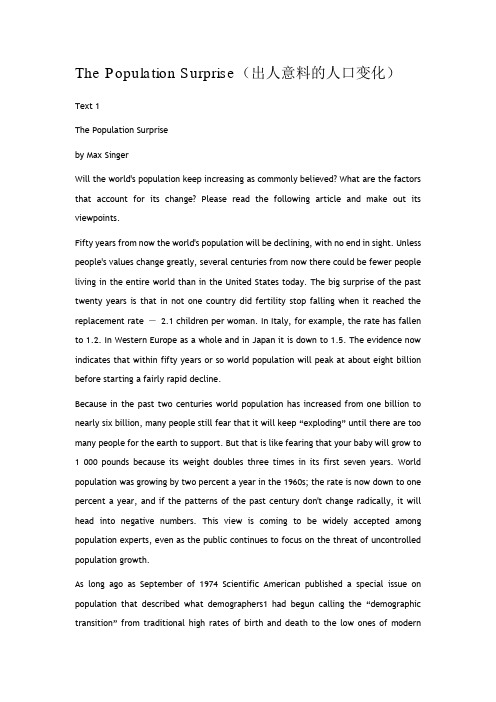
The Population Surprise(出人意料的人口变化)Text 1The Population Surpriseby Max SingerWill the world's population keep increasing as commonly believed? What are the factors that account for its change? Please read the following article and make out its viewpoints.Fifty years from now the world's population will be declining, with no end in sight. Unless people's values change greatly, several centuries from now there could be fewer people living in the entire world than in the United States today. The big surprise of the past twenty years is that in not one country did fertility stop falling when it reached the replacement rate -2.1 children per woman. In Italy, for example, the rate has fallen to 1.2. In Western Europe as a whole and in Japan it is down to 1.5. The evidence now indicates that within fifty years or so world population will peak at about eight billion before starting a fairly rapid decline.Because in the past two centuries world population has increased from one billion to nearly six billion, many people still fear that it will keep “exploding” until there are too many people for the earth to support. But that is like fearing that your baby will grow to 1 000 pounds because its weight doubles three times in its first seven years. World population was growing by two percent a year in the 1960s; the rate is now down to one percent a year, and if the patterns of the past century don't change radically, it will head into negative numbers. This view is coming to be widely accepted among population experts, even as the public continues to focus on the threat of uncontrolled population growth.As long ago as September of 1974 Scientific American published a special issue on population that described what demographers1 had begun calling the “demographic transition” from traditional high rates of birth and death to the low ones of modernsociety. The experts believed that birth and death rates would be more or less equal in the future, as they had been in the past, keeping total population stable after a level of 10-12 billion people was reached during the transition.Developments over the past twenty years show that the experts were right in thinking that population won't keep going up forever. They were wrong in thinking that after it stops going up, it will stay level. The experts' assumption that population would stabilize because birth rates would stop falling once they matched the new low death rates has not been borne out by experience. Evidence from more than fifty countries demonstrates what should be unsurprising: in a modern society the death rate doesn't determine the birth rate. If in the long run birth rates worldwide do not conveniently match death rates, then population must either rise or fall, depending on whether birth or death rates are higher. Which can we expect?The rapid increase in population during the past two centuries has been the result of lower death rates, which have produced an increase in worldwide life expectancy2 from about thirty to about sixty-two. (Since the maximum -if we do not change fundamental human physiology -is about eighty-five, the world has already gone three fifths as far as it can in increasing life expectancy.) For a while the result was a young population with more mothers in each generation, and fewer deaths than births. But even during this population explosion the average number of children born to each woman -the fertility rate -has been falling in modernizing societies. The prediction that world population will soon begin to decline is based on almost universal human behavior. In the United States fertility has been falling for 200 years (except for the blip of the Baby Boom3), but partly because of immigration it has stayed only slightly below replacement level for twenty-five years.Obviously, if for many generations the birth rate averages fewer than 2.1 children per woman, population must eventually stop growing. Recently the United Nations Population Division estimated that 44 percent of the world's people live in countries where the fertility rate has already fallen below the replacement rate, and fertility is falling fast almost everywhere else. In Sweden and Italy fertility has been belowreplacement level for so long that the population has become old enough to have more deaths than births. Declines in fertility will eventually increase the average age in the world, and will cause a decline in world population forty to fifty years from now. Because in a modern society the death rate and the fertility rate are largely independent of each other, world population need not be stable. World population can be stable only if fertility rates around the world average out to 2.1 children per woman. But why should they average 2.1, rather than 2.4, or 1.8, or some other number? If there is nothing to keep each country exactly at 2.1, then there is nothing to ensure that the overall average will be exactly 2.1.The point is that the number of children born depends on families' choices about how many children they want to raise. And when a family is deciding whether to have another child, it is usually thinking about things other than the national or the world population. Who would know or care if world population were to drop from, say, 5.85 billion to 5.81 billion? Population change is too slow and remote for people to feel in their lives -even if the total population were to double or halve in only a century. Whether world population is increasing or decreasing doesn't necessarily affect the decisions that determine whether it will increase or decrease in the future. As the systems people would say, there is no feedback loop.What does affect fertility is modernity. In almost every country where people have moved from traditional ways of life to modern ones, they are choosing to have too few children to replace themselves. This is true in Western and in Eastern countries, in Catholic and in secular societies. And it is true in the richest parts of the richest countries. The only exceptions seem to be some small religious communities. We can't be sure what will happen in Muslim countries4, because few of them have become modern yet, but so far it looks as if their fertility rates will respond to modernity as others' have.Nobody can say whether world population will ever dwindle to very low numbers; that depends on what values people hold in the future. After the approaching peak, as long as people continue to prefer saving effort and money by having fewer children, populationwill continue to decline. (This does not imply that the decision to have fewer children is selfish; it may, for example, be motivated by a desire to do more for each child.) Some people may have values significantly different from those of the rest of the world, and therefore different fertility rates. If such people live in a particular country or population group, their values can produce marked changes in the size of that country or group, even as world population changes only slowly. For example, the U.S. population, because of immigration and a fertility rate that is only slightly below replacement level, is likely to grow from 4.5 percent of the world today to 10 percent of a smaller world over the next two or three centuries. Much bigger changes in share are possible for smaller groups if they can maintain their difference from the average for a long period of time. (To illustrate: Korea's population could grow from one percent of the world to 10 percent in a single lifetime if it were to increase by two percent a year while the rest of the world population declined by one percent a year.)World population won't stop declining until human values change. But human values may well change -values, not biological imperatives, are the unfathomable variable in population predictions. It is quite possible that in a century or two or three, when just about the whole world is at least as modern as Western Europe is today, people will start to value children more highly than they do now in modern societies. If they do, and fertility rates start to climb, fertility is no more likely to stop climbing at an average rate of 2.1 children per woman than it was to stop falling at 2.1 on the way down.In only the past twenty years or so world fertility has dropped by 1.5 births per woman. Such a degree of change, were it to occur again, would be enough to turn a long-term increase in world population of one percent a year into a long-term decrease of one percent a year. Presumably fertility could someday increase just as quickly as it has declined in recent decades, although such a rapid change will be less likely once the world has completed the transition to modernity. If fertility rises only to 2.8, just 33 percent over the replacement rate, world population will eventually grow by one percent a year again -doubling in seventy years and multiplying by twenty in only three centuries.The decline in fertility that began in some countries, including the United States, in the past century is taking a long time to reduce world population because when it started, fertility was very much higher than replacement level. In addition, because a preference for fewer children is associated with modern societies, in which high living standards make time valuable and children financially unproductive and expensive to care for and educate, the trend toward lower fertility couldn't spread throughout the world until economic development had spread. But once the whole world has become modern, with fertility everywhere in the neighborhood of replacement level, new social values might spread worldwide in a few decades. Fashions in families might keep changing, so that world fertility bounced above and below replacement rate. If each bounce took only a few decades or generations, world population would stay within a reasonable narrow range -although probably with a long-term trend in one direction or the other.The values that influence decisions about having children seem, however, to change slowly and to be very widespread. If the average fertility rate were to take a long time to move from well below to well above replacement rate and back again, trends in world population could go a long way before they reversed themselves. The result would be big swings in world population -perhaps down to one or two billion and then up to 20 to 40 billion.Whether population swings are short and narrow or long and wide, the average level of world population after several cycles will probably have either an upward or a downward trend overall. Just as averaging across the globe need not result in exactly 2.1 children per woman, averaging across the centuries need not result in zero growth rather than a slowly increasing or slowly decreasing world population. But the long-term trend is less important than the effects of the peaks and troughs5 . The troughs could be so low that human beings become fewer than they were in ancient times. The peaks might cause harm from some kinds of shortages.One implication is that not even very large losses from disease or war can affect the world population in the long run nearly as much as changes in human values do. What we have learned from the dramatic changes of the past few centuries is that regardless ofthe size of the world population at any time, people's personal decisions about how many children they want can make the world population go anywhere -to zero or to 100 billion or more.(1916words)课文一出人意料的人口变化马克斯·辛格世界人口会象人们通常认为的那样持续增长吗?造成人口变化的因素是什么?请阅读下面的文章,并弄清其观点。
快速阅读2课文译文(uint1,2,4,6,7,8,缺unit3,5)
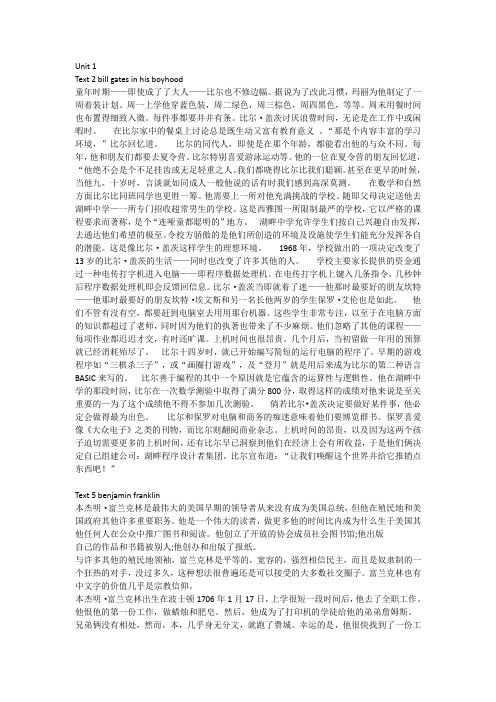
Unit 1Text 2 bill gates in his boyhood童年时期——即使成了了大人——比尔也不修边幅。
据说为了改此习惯,玛丽为他制定了一周着装计划。
周一上学他穿蓝色装,周二绿色,周三棕色,周四黑色,等等。
周末用餐时间也布置得细致入微。
每件事都要井井有条。
比尔·盖茨讨厌浪费时间,无论是在工作中或闲暇时。
在比尔家中的餐桌上讨论总是既生动又富有教育意义。
“那是个内容丰富的学习环境,”比尔回忆道。
比尔的同代人,即使是在那个年龄,都能看出他的与众不同。
每年,他和朋友们都要去夏令营。
比尔特别喜爱游泳运动等。
他的一位在夏令营的朋友回忆道,“他绝不会是个不足挂齿或无足轻重之人。
我们都晓得比尔比我们聪颖。
甚至在更早的时候,当他九、十岁时,言谈就如同成人一般他说的话有时我们感到高深莫测。
在数学和自然方面比尔比同班同学也更胜一筹。
他需要上一所对他充满挑战的学校。
随即父母决定送他去湖畔中学—一所专门招收超常男生的学校。
这是西雅图一所限制最严的学校,它以严格的课程要求而著称,是个“连哑童都聪明的”地方。
湖畔中学允许学生们按自己兴趣自由发挥,去通达他们希望的极至。
令校方骄傲的是他们所创造的环境及设施使学生们能充分发挥各自的潜能。
这是像比尔·盖茨这样学生的理想环境。
1968年,学校做出的一项决定改变了13岁的比尔·盖茨的生活——同时也改变了许多其他的人。
学校主要家长提供的资金通过一种电传打字机进入电脑——即程序数据处理机。
在电传打字机上键入几条指令,几秒钟后程序数据处理机即会反馈回信息。
比尔·盖茨当即就着了迷——他那时最要好的朋友坎特——他那时最要好的朋友坎特·埃文斯和另一名长他两岁的学生保罗·艾伦也是如此。
他们不管有没有空,都要赶到电脑室去用用那台机器。
这些学生非常专注,以至于在电脑方面的知识都超过了老师,同时因为他们的执著也带来了不少麻烦。
他们忽略了其他的课程——每项作业都迟迟才交,有时还旷课。
21世纪大学英语读写教程(四)unit2课文原文及翻译
We Need GratitudeA.J.CroninOn a fine afternoon in New York, I got into a taxi. From the driver's expression and the way he slammed in his gears, I could tell that he was upset. I asked him what was the trouble. "I've got good reason to be sore," he growled. "One of my fares left a wallet in my cab this morning. Nearly three hundred bucks in it. I spent more than an hour trying to trace the guy. Finally I found him at his hotel. He took the wallet without a word and glared at me as though I'd meant to steal it.""Not a cent. But it wasn't the dough I wanted..." he fumbled, then exploded, "If the guy had only said something..."Because his helpful, honest act had not been appreciated, that cabdriver's day was poisoned, and I knew he would think twice before rendering a similar service. The need for gratitude is something we all feel, and denial of it can do much to harm the spirit of kindness and cooperation.During World War II a mother in Cincinnati received a letter from her son in the army in which he spoke of a woman in a village in Normandy who had taken him into her home when he was wounded and hungry, and hidden him from the Germans. Later on, unhappily, the boy was killed in the Ardennes offensive. Yet the mother was moved by an irresistible intention. She saved up for two years, crossed the Atlantic and located the village referred to by her son. After many inquiries, she found the woman who had sheltered her son—the wife of an impoverished farmer—and pressed a package into her hand. It was the gold wristwatch her son had received on his graduation, the only object of real value the boy had ever possessed. The mother's act of gratitude so touched people's hearts that it has become something of a legend in and around the village. It has done more than fine speeches to foster good feeling toward Americans.Gratitude is the art of receiving gracefully, of showing appreciation for every kindness, great and small. Most of us do not fail to show our pleasure when we receive hospitality, gifts and obvious benefits, but even here we can perfect our manner of showing gratitude by making it as personal and sincere as possible. Recently, when touring in southern Italy with my wife, I sent to a friend in Connecticut several bottles of a local wine which had taken our fancy. It was a trifling gift, yet to our surprise, instead of the conventional letter of thanks, we receive a phonograph record. When we played it, we heard our friend's voice speaking after dinner, describing how he and his guests had enjoyed the wine and thanking us for our thoughtfulness. It was pleasant to have this unusual proof that our gift had been appreciated.Gratitude is sometimes more than a personal affair. My son, studyingmedicine at McGill University, told me of a patient brought into hospital in Montreal whose life was saved by a blood transfusion. When he was well again he asked: "Isn't there any way I can discover the name of the donor and thank him?" He was told that names of donors are never revealed. A few weeks after his discharge he came back to give a pint of his own blood. Since then he has returned again and again for the same purpose. When a surgeon commented on this splendid record of anonymous service, he answered simply: "Someone I never knew did it for me. I'm just saying 'thanks'".It is a comforting thought that gratitude can be not merely a passing sentiment but a renewal which can, in some instances, persist for a lifetime. A husband who recalls appreciatively some generous or unselfish act on his wife's part, or a wife who never forgets the gifts her husband has given her, does much to keep the domestic wheels spinning smoothly. W.H. Hudson, British author and naturalist, has written: "One evening I brought home a friend to share our usual evening meal. Afterward he said to me:‘you are fortunate to have a wife who, despite ill health and children to look after, cooks such excellent meals.' That tribute opened my eyes and taught me to show gratitude for my wife's day-to-day heroism, which I had hitherto taken for granted."It is, above all, in the little things that the grace of gratitude should be most employed. The boy who delivers our paper, the milkman, the mailman, the barber, the waitress at a restaurant, the elevator operator —all oblige us in one way or another. By showing our gratitude we make routine relationships human and render monotonous tasks more agreeable.A patient of mine in London who worked as a bus conductor once confided to me, "I get fed up with my job sometimes. People grumble, bother you, haven't got the right change for their tickets. But there's one lady on my bus morning and evening, and she always thanks me in a particularly friendly way when I take her ticket. I like to think she's speaking for all the passengers. It helps me to keep smiling."Arnold Bennett had a publisher who boasted about the extraordinary efficiency of his secretary. One day Bennett said to her, "Your employer claims that you are extremely efficient. What is your secret?" "It's not my secret," the secretary replied. "It's his." Each time she performed a service, no matter how small, he never failed to acknowledge it. Because of that she took infinite pains with her work.Some persons refrain from expressing their gratitude because they feel it will not be welcome. A patient of mine, a few weeks after his discharge from the hospital, came back to thank his nurse. "I didn't come back sooner," he explained, "because I imagined you must be bored to death with people thanking you.""On the contrary," she replied, "I am delighted you came. Few realize how much we need encouragement and how much we are helped by those whogive it."Gratitude is something of which none of us can give too much. For on the smiles, the thanks we give, our little gestures of appreciation, our neighbors build up their philosophy of life.一个晴朗的下午,我在纽约上了一辆出租车。
大学英语泛读教程第四册全文翻译..
大学英语泛读教程第四册全文翻译..Unit 1Text天才与工匠许多人羡慕作家们的精彩小说,但却很少有人知道作家们是如何辛勤笔耕才使一篇小说问世的。
以下的短文将讨论小说的酝酿过程,以及作家是如何将这小说雕琢成一件精致完美的艺术品。
1.有一次,我在暮色中来到小树林边一棵鲜花盛开的小桃树前。
我久久站在那里凝视着,直到最后一道光线消逝。
我看不到那树原先的模样,看不见曾穿透果核,能崩碎你的牙齿的力量,也看不到那使它与橡树和绿草相区别的原则。
显现在我面前的,是一种深邃而神秘的魅力。
2. 当读者读到一部杰出的小说时,他也会这样如痴如狂,欲将小说字字句句刻骨铭心,不提出任何问题。
3.但即使是个初学写作者也知道,除那将小说带到世上的文字之外,还有更多的构成小说生命的因素,小说的生命并不始于写作,而始于内心深处的构思。
4. 要创作出有独创性的作品,并不要求懂得创造的功能。
多少世纪以来的艺术、哲学及科学创造都出自人们的头脑,而创造者也许从未想到去关注创造的内在过程。
然而,在我看来,对创造工作一定程度的了解,至少会使我们通过知道两个事实,增长我们处理正在出现的故事的智慧。
5. 首先,天赋不是掌握了技艺的艺术家独有的特性,而是人脑的创造性功能。
不仅所有对技艺的掌握都含有天赋,而且每个人都具有天赋,无论他的天赋发展是何等不充分。
对技艺的掌握是天赋的显现,是经过培养的,发展了的和受过训练的天赋。
你的天赋在最原始的层面上起作用。
它的任务就是创造。
它是你的故事的创造者。
6. 第二,将你的小说带进世界的文字是艺术家的工作,它就和一个泥瓦匠的工作一样,有意识、谨慎而实实在在。
天赋正如理解力、记忆力和想象力一样是我们的精神禀赋中的天然部分,而技艺却不是。
它必须通过实践才能学到,并要通过实践才能掌握。
如果要使在我们内心深处浮现的故事跃然纸上,光彩照人,那么,每个故事都须有感染力极强的优雅文笔。
只有健全的技艺才能使我们做到这一点。
7.一个故事是如何酝酿成的呢?据说,我们从一生中的前二十年,或许前五年起就开始写作。
大学英语第四册汉译英
大学英语第四册汉译英-CAL-FENGHAI.-(YICAI)-Company One1Unit 11.His conclusion sounds reasonable, but it is actually a fallacy. 他的结论听起来合理,但实际上却是个谬误。
2.His skill in negotiating earned him a reputation as a shrewd businessman. 他的谈判技巧使他赢得了精明商人的名声。
3.Yesterday, Canada's foreign minister met his Russian counterpart in Moscow to discuss theirtrade issues. 昨天加拿大外长在莫斯科会晤了俄罗斯外长,商讨两国贸易问题。
4.The hotel is an ideal venue for conferences and business parties. 这家酒店是开会及商业聚会的理想场所。
5.He never arrives on time, and my inference is that he feels the meetings are useless. 他从不准时,我的推断是他觉得这些会议都没用。
6.This argument is based on the premise that there is life on the planet Mars. 这一论点是以火星上有生命为前提的。
7.It may be difficult to discern the difference between the two paintings at first, but if you lookcarefully, it will become apparent. 一开始要看出这两幅画的差异可能很难,但仔细看就明显了。
大学英语精读book4-unit2
Book4-unit2turn of mind: adj. a characteristic tendency or way of thinking性情;气质倾向,才能He has an optimistic turn of mind.因为他的想法奇怪,行为也和别人极为不同。
With a very peculiar turn of mind, he behaves very differently from anyone else.convert into:1) change into转变, 转化One last effort converted defeat into victory.The hotel has been converted into an office building.2) cause (a person) to change his beliefs, etc. 皈依;改变信仰他们已经改信佛教。
They have converted to Buddhism.reserve:1. n.1) sth. kept for later use贮藏; 储备有些动物在秋季储备大量的食物,以防冬季挨饿。
Some animals keep a great reserve of food in fall to keep from starving in winter.2) a piece of land kept for a (stated) purpose保护区Laws and regulations are made to protect the wildlife reserves.他在自然保护区拍了很多狮子的照片。
He took a lot of photos of the lions in the nature reserves.2. vt. keep for special purpose 保留,预订这些座位是留给贵宾的。
- 1、下载文档前请自行甄别文档内容的完整性,平台不提供额外的编辑、内容补充、找答案等附加服务。
- 2、"仅部分预览"的文档,不可在线预览部分如存在完整性等问题,可反馈申请退款(可完整预览的文档不适用该条件!)。
- 3、如文档侵犯您的权益,请联系客服反馈,我们会尽快为您处理(人工客服工作时间:9:00-18:30)。
Negotiating for mutual satisfaction谈判的双赢
有一个传奇故事,已成为谈判的民间传说的一部分:
一个哥哥和姐姐已在一些吃剩的饼争吵,每个大的一块。
每个人都希望得到一个大的一块,但又不想被对方欺骗。
当男孩的获得控制刀的权利,并准备为自己切份大的馅饼的时候,他们的父母来到了现场。
在国王Soloment传统,家长说,“等一等吧!我不关心谁是切成两块馅饼,但谁也得给其他有权选择他们想要的一块。
”自然,为了保护他自己,男孩切分成两个大小相等的块板。
这则故事可能是杜撰的,但其中蕴含的道德仍然持续至今。
很多情况下,事件中的主角们需求没有形成对立。
如果焦点转换形式,由为了击败对方而转变成战胜问题,那么大家都能受益。
在合作双赢的谈判中,我们都在尝试制作这种结果,让每一方都获得可以接受的增益。
争执被视为人类自然天性中的一部分.,如果争论被认为一个需要被解决的问题,可以发现创造性的解决方案,来加强双方的立场,各方甚至可能会更密切地联系在一起。
这可能是一种巧合,但在劳资双方的集体谈判用馅饼作比喻被习惯性地谈论着。
一方通常会说,“我们只是希望我们的馅饼的形状!”但是,如果馅饼是固定金额的钱,一方获得收益,另一方必然会失去,考虑下面的例子:
在谈判陷入僵局后,工会进入罢工。
如果工会获胜,在罢工期间损失将超过工资上涨的好处。
相反,罢工后,公司管理者们损失会比没有罢工工会所要求的成本更高。
因此,双方都有损失。
如果没有罢工,在一个相互信任的气氛,他们可以实现和解,使双方得到他们想要的。
尽管在这个逻辑,我们继续看到这里不仅仅是组织罢工的工会和公司管理者们输了,还有公共经济,甚至国家利益受到损失.为什么会这样呢?也许部分问题可以是用蛋糕来打比方.当我们都关注在这个固定的金额上,并开始来回争论、作出要求,反要求,结论和最后通牒,没有创造性的结果.与之相反,我们应该看到我们真正的兴趣是在于我们的互补性和彼此的影响,并询问对方,“怎么能够通过一种方式,一起把这个蛋糕做大,使双方获得更大的发展空间?”
显然,这并不单单指劳动关系,还有每一个持续发展的谈判关系.如果你思考一会儿,你将会看到,几乎涵盖了你所有的谈判的想法。
如同自然不会创造相同的人类一样,您的需求和我的需求通常是不相同的。
因此,这有可能使我们双方都取得胜利。
每个人的独特性似乎是一个公认的事实- 至少在一个智力水平,那么为什么我们接手大多数谈判时,好像对方是偶然遭遇到的敌手,必须在对方的花费的情况下才使你满意。
原因是在大多数的谈判中,讨论的是“固定金额“,通常的钱。
我们许多人已经习惯于在我们的青年时期接受金钱。
被引导相信自己喜欢的颜色应该是绿色的--绿色的美元。
听人说话,你有时会认为他们是生活美元的符号中.但如果您认为很多谈判仅仅是以前为中心,那你就错了。
人们并不是讲话的方式或看起来所表现的那样。
钱当然是需要的,但它只是其中之一。
如果你忽视他们的其他需要,满足人们的美元需求,也不能使他们感到高兴。
让我通过一个假设的情况证明这一点。
而通过一个晚上都在翻阅一本杂志,两个人一起生活--丈夫和妻子说——发现一个作为广告片的背景使用古董时钟。
妻子评论说:“这不就是你见过的最美丽的时钟吗?若把它放在在我们的早教中心的走廊或门厅不是很美妙吗?“
丈夫回答说:“它肯定会的!我不知道它的成本。
有没有在广告中的价格标签。
“
他们决定一起去在古董店寻找这个钟。
他们都同意,如果他们找到,他们将支付不超过500元。
经过三个月的搜寻,他们终于看到时钟显示在展示摊位古董。
“就在那里!”妻子激动不已地嚷着。
“你说得对,就是它!”说丈夫说,“记住,”他补充道,“我们不打算支付超过500美元!”他们走近了展台。
“哦哦”妻子嘟囔着。
“钟的顶端上有了一个标签显示750美元。
我们本可能会回家。
我们说过花费不超过500美元,还记得吗?”
“我记得,”丈夫说,“但不管怎样,现在让我们再受一次打击吧。
我们找了这么久。
”他们依偎跟前,指派他为代表,为了一个渺小的机会争取为500美元。
他鼓足勇气,他向时钟推销员做了自我介绍。
“我看到你有一个小的时钟出售。
我注意到它的价格。
我也注意到这个独一无二品质的古董标签上沾满了灰尘”丈夫现在说:“告诉你我将做什么。
我要给你提供一接一个的价钱。
我确信这将会刺激到你的,你准备好了吗? "他停效果。
”——这是250美元。
时钟的推销员,却面不改色,说:“这是你的了,卖给你。
”
她的丈夫的第一反应是什么?得意洋洋?还是对自己说,“我做的非常出色,砍掉了相当多的价钱?见鬼!你跟我一样清楚,因为我们都有过类似的情况,他最初的反应是:“我怎么这么笨!我应该说是150美元的!”你也知道他的第二次的反应:“这个钟一定有什麽地方不对劲!”
当丈夫把钟放到他的车上时,他对自己说:“这肯定是正确的,因为我没有那么厉害!我可以打赌,一些内部件失踪!“
不过,他提着钟走到他们家门口走廊时。
令人震惊的是,这种似乎是做工精细,但他和他的妻子感到不安。
在退休后,他们在半夜起床三次。
为什么呢?他们确信他们没有听到钟声。
这样的情况持续了很多的白天和失眠的晚上。
他们的健康迅速恶化,他们慢慢有了高血压。
为什么?因为时钟售货员居然以250 美元出售他们的时钟。
如果他是一个体面的,合理的,富有同情心的人,他会允许谈判到497美元的这样快乐和自我满意足。
通过节约247美元,他会最终夺去他们的三倍利润来刺激他。
这次谈判中的典型错误是,所有的注意力引导到一个单一的面,价格。
如果这对夫妇是单向思维,仅需要钱,他们会狂喜的。
但,所有人一样,他们是多面,有许多需要,有些不自觉的和不被承认的。
令人满意的是,这对夫妻的价格需求本身并不让他们感到高兴。
显然得到理想的时钟价位在他们看来是不够的。
在这种情况下,谈判结束得很快,他们需要一些闲聊,建立一种信任,甚至一些程序。
如果丈夫已经能够对抗卖方他的智慧成功,这一过程将会使他感觉好些,有关购买和他自己。
以前,我们说,谈判是双方在这一活动中试图满足他们的需求.。
然而,他们的实际需要很少像他们表现的那样,因为谈判试图隐瞒他们或没有察觉到的。
.因此,谈判从未完全公开得谈论或争议什么,无论是价格,服务,产品,地区,优惠利率,或金钱。
.什么正在讨论,并在它正在考虑的方式,用以满足心理需要。
谈判是一个交换的材料.它是一个演技和表现,可以发展认识,信仰,接受,尊重的方式,和信任。
它是你的处理问题的方式,你使用的方法,以及你表现出对于对方的感受和需求的关心。
所有这一切构成了谈判。
因此过程中,你去努力获得有关你的目标的方式本身可能并满足对方的一些需要。
以上观点,我们探讨了为什么谈判往往会不必要地陷入对手的斗争,涉及到需求的满足,我们建议,这一进程本身,我们解决有关冲突的方式,满足参与者长远.的需要,因为所有的人都是独特的,潜在对手的需要,可以统一或协调。
